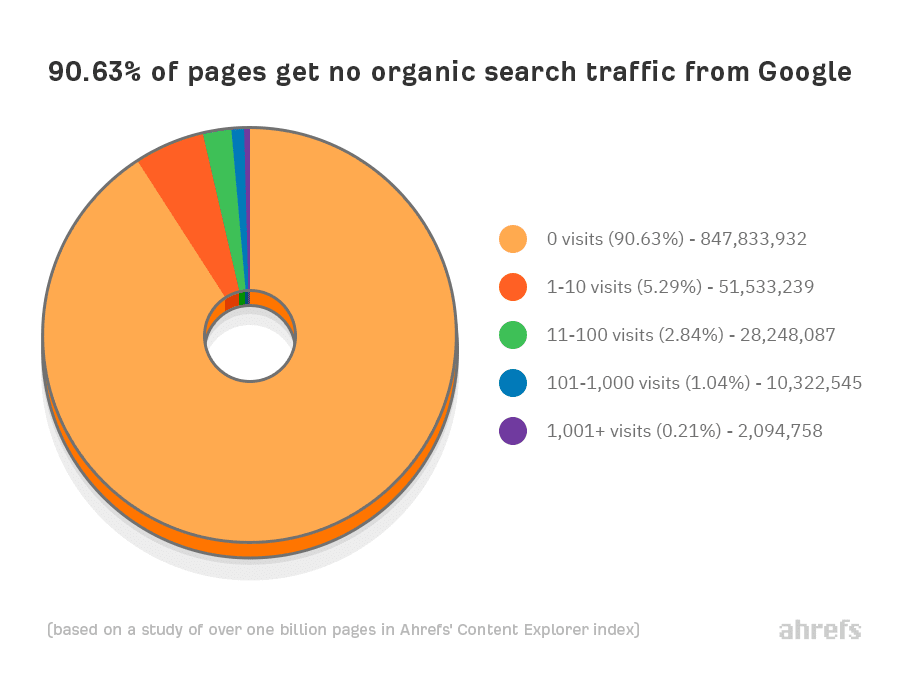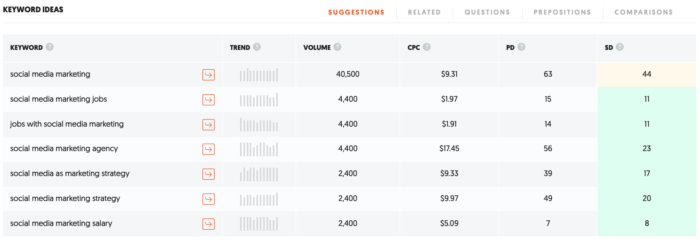What Is Keyword Research?: The Ultimate Beginner’s Guide
What is Keyword Research? We have written this guide for beginners to learn how to do keyword research to reach your target audience online.
Approximately 3.5 billion Google searches are made worldwide each day. When you look more deeply into this number, it amounts to about 400,000 searches each second. You read that right: in the time it’s taken you to read this short paragraph, well over a million people entered a search term into Google.
As a growing business, it’s important to do keyword research to ensure that your site pops up in some of these searches. But what is keyword research, exactly? How can you use words and phrases related to your website to boost visibility and drive traffic?
That’s what we’re going to talk about today. Read on to learn all about keyword research and how you can use it to ensure professional success!
What Is Keyword Research?
Simply put, keyword research is the process of finding the keywords that your page should be ranking for in Google and other search engines.
During this process, you will find the keywords that are most heavily associated with your site. You also will look into your current rankings for these search terms, whether or not they’re driving a lot of traffic, and how difficult it will be to rank for them in the future.
Keyword research/the use of keywords is a part of on-site search engine optimisation (SEO). You add keywords to the quality blog content that you produce, which is something that you’re manipulating within your site. Since on-site SEO refers to strategies that you employ within your webpage rather than outside of it, keyword use is an on-site strategy.
Every time someone uses the internet- so, incredibly often- they use keywords. For example, if a person searches for ‘Chinese takeaway in Canterbury,’ this is a keyword that drives traffic to websites that rank for it.
Keyword use is the very first step toward an effective SEO strategy. DIY SEO is no different. You need to look into these search terms so that you can drive future traffic to your webpage.

Why Is Keyword Research Important?
Now that you know what keyword research is, you’re likely wondering why it’s important. While there admittedly are other strategies that can help bolster your web traffic, none are nearly as effective as looking into search phrases and incorporating them into quality content. Read on to learn why this is the case.
Drive Traffic to Your Site
As we brushed on before, keyword use drives traffic to your site. But why does this matter? Here are some of the main reasons why boosting your visibility and getting your clicks matters:
- Since between 71-92% of people don’t go past the first page in Google, boosting your rankings is the only way to make an impression
- You have the opportunity to show off the awesome services that you provide (remember- you’re #1, always)
- The people who are actively looking for your services will see them because they’ve entered related search terms into Google
- You can use your engaging content (blog posts, video content, graphics, etc) to become more memorable to your audience
- These people would otherwise have entirely forgotten about your business, even if they had the opportunity to know about it
- You can get people to contact you by offering promotions and deals for first-time buyers
- Driving traffic –> lead generation
Clearly, there are lots of important things that happen after your visibility goes up!
Generate Leads
We said before that more visibility leads to greater lead generation, which is absolutely true. This is one of the biggest benefits of performing keyword research that boosts your rankings.
One of the main ways that businesses like yours generate leads is via a landing page. On these pages, you will ask consumers to enter some data into a pre-made form. This form typically asks for the name, email address, occupation, and other relevant information of the person filling it out.
Potential clients will usually be happy to enter this information to get an exclusive promotion or coupon code. They also may enter it into your site so that they can sign up for a mailing list. In any case, most consumers are happy to give you this information- and, as a result, a lead- in exchange for some small reward.
You can also ask for site visitors to allow cookies that provide you with their information. This gives you a similar result.
You can then use this information to see who is visiting your site. This allows you to develop a more accurate buyer persona and optimise your page to the people who are actually interested in your services.
You can also generate leads by using Google analytics. When more people find you through relevant keywords, you can enter your page into analytics technology to track who is visiting your page. You can specifically see the most common searches that these people have made and look for trends.
Produce Quality Content
Finally, keyword research allows SEO professionals (or in-house employees) to produce quality content for your website. While keyword stuffing shouldn’t be happening, incorporating key phrases into your content definitely makes it more palatable to readers. This is because they get a clearer picture of what you’re writing about and what your objectives are in communicating with them.
Additionally, the topics are more likely to be about the precise phrases that consumers were searching for. This makes content more relevant to their precise needs and is more likely to engage them.
Keyword research also leads to better content in that it’s goal-oriented. The writer knows exactly what your business needs to write about (or produce other content about) in order to thrive. This ensures that you aren’t investing in blog posts that provide no value to your business.
How to Do Keyword Research
At this point, it’s pretty clear why researching keywords is essential to growing your business. That’s awesome! Let’s take a look into how to do keyword research so that you can find the most relevant and easy-to-rank-for search terms for your professional webpage.
Make a List of Potential Keywords
The first step in performing keyword research is making a preliminary list of potential keywords that you may want to focus on. This shouldn’t take you too long- it requires nothing but a bit of critical thinking and common sense. Ask yourself the following questions:
- What are the most relevant topics based on what you know about your market/industry?
- What are the most relevant topics based on what you know about your individual business?
- What content gets the most attention on your pre-existing website? (Google Analytics is your friend here)
- What questions do consumers come to you with the most often? (Many of the best keywords are commonly searched questions)
- What are the goals and objectives of the buyer persona that you have already established?
Jot the phrases that you come up with down on a sheet of paper or in a word document. This will be critical for the next step of the research process.

Research Related Search Terms
Okay, so now you have a list of terms that you think might be good keywords. That’s awesome!
Head over to SEMrush. This is an SEO research tool that you need to know about as someone trying to optimise your page. They can tell you what keywords you’re currently ranking for, how effective your current link building is, your volume of traffic, and many more things.
For now, we’re going to focus on the ‘keyword research’ section of this site. Let’s say that you’re running a law firm and believe that people are coming to you with inquiries using the keywords ‘personal injury attorney’ and ‘domestic abuse lawyer.’ You’ll want to enter both of these keywords into SEMrush and take a look at the information that the site provides.
Your goal is to find a keyword that has:
- High search volume (above 100- the higher, the better)
- Low keyword difficulty (abbreviated as ‘comp’), which tells you how hard it will be to rank (generally, a comp rating of below .4 is good, but lower is better)
There is some other information that will pop up, too, but you as a beginner can ignore it for now.
You will get a report that gives you the following (true) information:
Personal injury attorney
- Search volume 33100
- Comp 0.24
Domestic abuse lawyer
- Search volume 390
- Comp 0.72
This means that between the two keywords we looked at above, ‘personal injury attorney’ is by FAR the superior option. You should base your content around that keyword!
In addition to SEMrush, we offer some free SEO tools on our page that you may be interested in. More research tools mean better results!

Hire an SEO Professional
While in-house or DIY SEO works for small business startups, it’s generally best to hire an expert once you have the funds to do so. Professionals have access to a multitude of research tools that will be difficult for you to access. Even if you do pay for them and gain access to them, you won’t know how to use every function that they provide.
SEO experts can offer you greater results than you could garner on your own. Reach out to our professionals and let them know that you’re interested. We’ll help you to optimise your page on-site to ensure that your business gets the attention that it deserves.
What Is Competitor Research?
Competitor research, sometimes known as competitor analysis, is exactly what it sounds like. You collect information from your direct competitors so that you can look into what they’re doing right and what they could improve on. This lets you optimise your online marketing strategy to get a leg up over other businesses.
Competitor analysis can help you understand your market better and be more effective in forecasting upcoming developments within your industry. It also can help you learn what your competitors are offering and what the going price for these services are. Most importantly, this analysis can generate leads for you since you can see who follows your direct competition and reach out to them with better offers.
Though you should begin assessing your competitors immediately after setting up an online site, it’s critical that this analysis be an ongoing process. Digital marketing strategies are always changing, and your competitors will be optimising their websites and content in the same way that you will be. You should be aware of what they’re up to so that you can continue to best them with your online presence.
What Does This Have to Do With Keyword Research?
Competitor research is awesome, but why are we talking about it here? What does it have to do with keyword analysis?
Well, as it turns out, it has everything to do with researching keywords that drive traffic.
First of all, when on competitor sites, you can see the words and phrases that they employ consistently within their blog posts and product descriptions. This gives you an idea of what keywords you should incorporate into your future content. Plug them into your research tools to see their KD. This will let you know what you need to focus on to boost your page over the competitors.
You can also copy-paste the URLs of these sites into the ‘rankings checker’ tools on SEMrush. This will definitively show you the keywords that they rank most highly for and how much traffic they drive to the site.
Get Started
So, what is keyword research, exactly?
It’s looking into the search terms that can propel your website upward in Google rankings, but there’s so much more to it than that!
Now that you know about keyword research and competitor analysis, it’s time to get started. Check out our free SEO resources before contacting us with any lingering questions that you may have. We’re happy to help you create both on-site and off-site SEO strategies that drive traffic and generate leads for your business.

